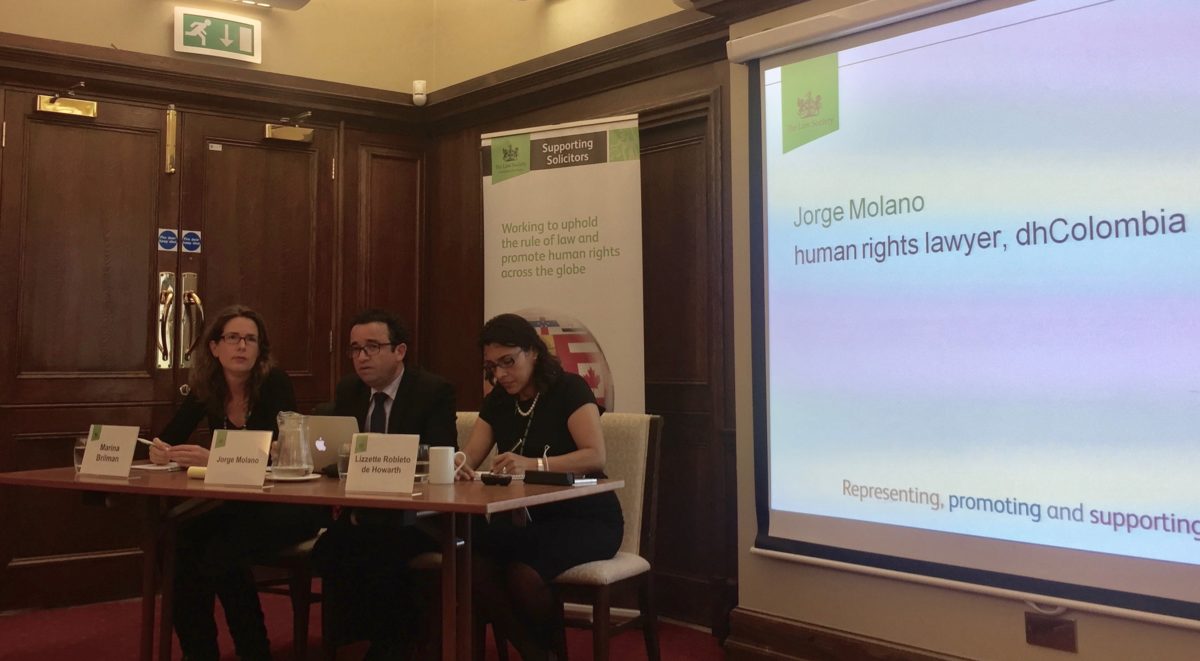El abogado de derechos humanos Jorge Molano, de la Organización No Gubernamental de abogados en Colombia – dhColombia – Red de Defensores y Defensoras de Derechos Humanos – hablaron en «Teh Law Society» de Inglaterra y Gales , el 17 º de mayo de 2017, invitado como parte del programa de abogados en riesgo . Él expresó su preocupación por la firma del acuerdo de paz entre el Gobierno colombiano y las Fuerzas Armadas Revolucionarias de Colombia (FARC-EP), que está lejos de hacer las cosas mejor para los defensores de derechos humanos en Colombia.
Human Rights lawyer Jorge Molano, from Colombian law firm and NGO dhColombia – Red de Defensores y Defensoras de Derechos Humanos – spoke at the Law Society of England and Wales on 17th May 2017, invited as part of the programme Lawyers at Risk. He raised concerns over how the signing of the peace agreement between the Colombian Government and the Colombian Revolutionary Armed Forces (FARC-EP) has gone far from making things better for human rights defenders in Colombia.
Asking him about this directly, Jorge’s response was alarming. He explained that in 2016, a human rights defender was killed every 6 days. In 2017, that figure had gone up to every 4 days.
As Colombia enters this transitional phase, Jorge talked about the state’s intolerance of any critique and how instead, human rights defenders are actually being criminalised. He played an excerpt from a spokesperson from the Office of the Attorney-General, la Fiscalía, regarding a community leader called Milena, who was being prosecuted for organising a people’s march. The spokesperson’s view was that Milena should rightly be punished as she was responsible for organising numerous marches and as a community leader, was stirring the masses,
And so Jorge’s concern was quite clear: whilst Colombia enters this transitional stage, hoping to repave the future of the country, it is also paradoxically condemning social protest and sending quite a confused and worrying message as to the apparent lack of importance that it places on democracy by continuing to consider political opponents and those partaking in social movements as “enemies of the state”.
Moreover, of the land seized by the paramilitaries during the conflict, he pointed out that only 0.13% has since been returned to the peasant farmers. He raised concerns about high impunity rates in both the ordinary courts, and in the Justice and Peace Tribunals[1]. The latter has been set up to demobilise members of the Autodefensas Unidas de Colombia. Jorge explained how the rate of impunity in cases brought before the Justice and Peace Tribunals stands at a shocking 99.8%. Therefore, there are concerns over whether there will be justice and reparations for the victims at the Special Jurisdiction for Peace. A body separate from the regular courts, its aim is to investigate human rights violations and war crimes committed during the conflict and having at its discretion, the power to pardon the perpetrators in exchange for truth. Jorge was of the opinion that high impunity rates were simply an incentive for the perpetrators to keep quiet. His view was that if somebody was not at risk of being convicted with a severe custodial sentence in the ordinary courts, they would not bother to come forward voluntarily before the Special Jurisdiction for Peace, to confess to their crimes.
When asked what could be done about this situation, Jorge explained that the English, American and Israeli secret services held a vast amount of intelligence on the war crimes committed, due to their involvement in Colombia during the conflict. He suggested lobbying the respective intelligence agencies to declassify this information, so as to expose those responsible for the atrocities. Other ways that Jorge suggested to support lawyers in Colombia included, trial observations; interventions via amicus briefs to respect international standards; collaborating to bring multinationals to account in their jurisdiction of origin. Lastly, he recommended continuing to send international delegations to Colombia such as the Colombian Caravana, to monitor access to justice and the implementation of the peace agreements.
Rishi Joshi
[1] Law 975 of 2005, known as Justice and Peace Law
Fuente: http://www.colombiancaravana.org.uk/beyond-peace-agreement-jorge-molano-talks-law-society/

